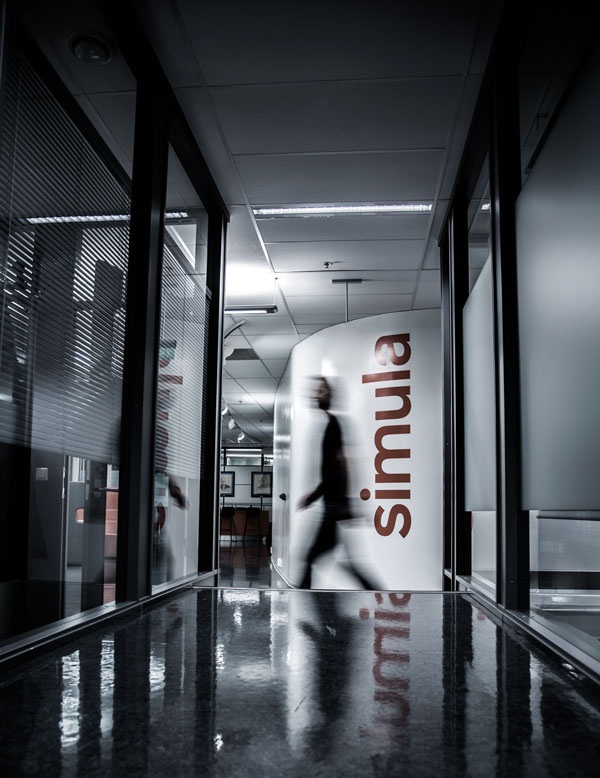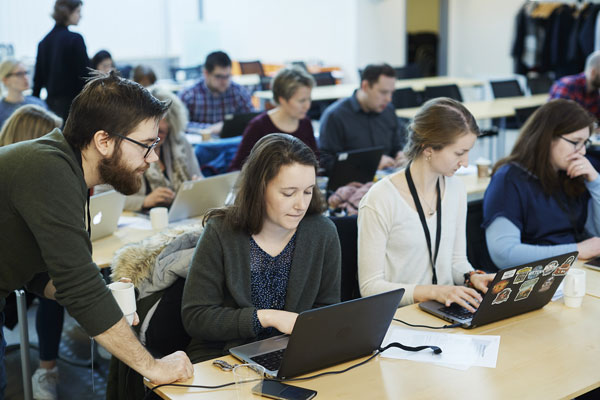Simula is an ICT research laboratory that pursues important and fundamental problems of science and engineering in order to drive progress that is of genuine value to society. Closely integrated into the research is the education of future scientists and the development of commercial ventures.
Since its establishment in 2001, Simula has grown and now comprises three research units in Norway. Despite the geographic spread, the research foci remain concentrated on five areas: cybersecurity (in Bergen), communication systems and machine learning (in Oslo), and scientific computing and software engineering (in Fornebu).


Simula pursues important and fundamental problems of science and engineering in order to drive progress that is of genuine value to society. Closely integrated into the research is the education of future scientists and the development of commercial ventures. Photos: Simula.
Scientific computing underpins much of today’s technological and societal advances. Simula develops new mathematical tools to enable multi-scale simulation models, from the cellular to the organ level, to interrogate fundamental biomedical questions. The large amount of data generated in this era offers enormous opportunities, Simula develops new algorithms for data-driven simulations and the efficient use of modern large-scale computers.
Software systems are becoming increasingly intelligent, dynamic, and unpredictable. Such complex systems require innovative validation and verification paradigms, in order to handle the unpredictability of future AI-enabled systems.
As modern society becomes increasingly digitized, it is of utmost importance that our communication infrastructures are extremely robust. Simula’s researchers identify and investigate issues with society’s telecommunications infrastructure and aim to provide new technology and solutions to address these issues. For instance, our networks must be both robust and flexible in order to support a wide range of applications, from automation to self-driving cars to the tactile Internet.
There is also a critical need today for new cryptographic solutions, not only to secure the processing of sensitive data on cloud computing platforms but also to protect against future attacks from quantum computers. Simula’s research on cyber security has two primary goals: to acquire a deep understanding of how to protect sensitive information through the use of mathematical methods, and to design secure and reliable communications and storage solutions.
Machine learning and data science touch upon all of Simula’s research fields, either by contributing to the development of these fields, or by actively using machine learning as part of the research. As with the other research foci, Simula’s machine learning researchers conduct basic research in order to strengthen the link between theory and algorithms, but always with an eye towards linking algorithms to high-impact applications that are of particular relevance to society.
An integral part of conducting excellent research is educating and training tomorrow’s scientists and technology experts. Simula provides educational opportunities from Master’s through the postdoctoral levels and these activities are closely integrated with research and innovation. Simula partners with a large number of degree-awarding institutions, both within Norway and internationally, allowing Simula to offer a range of possibilities for research stays abroad.
Innovation activities are an inherent part of technology research, as the conceptual work is applied to real life. Simula provides both pre-seed support for technology entrepreneurs, with free office space and relevant support services, as well as real financial investments for promising start ups. By realizing the commercialization of research results, both via industrial partnerships and the creation of spin-off companies, Simula keeps its focus on solving problems that add value to society.
By joining ERCIM, Simula hopes to build a stronger European network within our scientific fields.
Please contact:
Kyrre Lekve, Deputy Managing Director Simula Research Laboratory, Norway
https://www.simula.no











